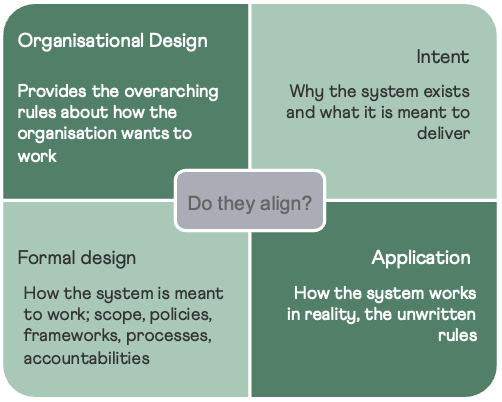Systems of Work – Why Intent Matters
In most organisations, people talk about processes – the logical step by step activities that go into producing an outcome. But sometimes, we need to step back and look at the whole system of work. By ‘system of work’ we mean the approach to getting the work done – including why the work happens, what the intention of the system is, how tasks are performed, by who, to what standard, and how information is organised or categorised. The system specifies the tools and equipment needed, sets training and competency requirements, and integrates safety measures to mitigate risks. It also involves monitoring and supervision to maintain standards, as well as effective communication and reporting processes to keep everyone informed. A system of work can be a complex beast.
When considering your system, there are 4 important perspectives to evaluate it by – we’ve shown them in our Systems Design Framework below.
We want you to get deliberate about what the INTENT of your system of work really is. This sounds simple, but in many organisations, there is no stated intent for major systems of work.
Let's take a look at remuneration practices as a simplistic case study in being deliberate (or not). When we discuss remuneration strategies, we rarely come back to the basic principles of why we pay employees. What is the reason for the exchange? Because the reasons that organisations pay employees have become murky over centuries.
For OUTPUT? At the start of the industrial revolution, people were mostly paid for delivering an outcome. In exchange for working a harvest, or shoeing a horse, or selling artisan wares, they received either an exchange of goods or money. In some instances, there were roles that received a wage (such as household staff), but time was considered very differently – in months or years, rather than hours. Because very few people had a clock or a watch that marked the days as they do now, time was seen differently.
Or for TIME? As the industrial revolution progressed, the movement of work away from agrarian and artisan activities, towards mass manufacturing resulted in larger workforces, working in heavily repetitive tasks. Whilst the industrial revolution had the benefit of distributing wealth and creating a middle class, it also had the dubious distinction of re-arranging ‘work’ into a series of tasks and moving towards paying people for their ‘time’ rather than outputs. Because work environments were often unsafe and work mundane and poorly paid, unions were created, and fought for common conditions for workers, which became the basis of the industrial relations system – conditions enshrined in awards, that sought to protect a common standard for everyone, regardless of performance level or output.
And WHAT IS YOUR TIME WORTH? In the later stages of the Industrial revolution, inventors such as Henry Ford (Ford Motors) found that the impact of these mundane and task-oriented roles was increased turnover (at one point 370%), as more and more people would opt out of roles that we would now consider psychologically damaging. At the time however, he addressed this issue by increasing Ford’s rates of pay to an astounding $5 per day (more than double what it had been). The result? Your wellbeing is sell-able.
Whilst work conditions have changed significantly over time, remuneration systems created over 200 years continue today, embedded in employment laws and organisational practices. A miasma of confusion over what we pay employees for....and your remuneration practices continue to be built on this, unless you come back to the core intent of why you pay people.
So - what is YOUR organisation paying employees for? TIME, OUTPUT or something else entirely? Start your strategies with 'WHY' to create clarity, then build organisational systems around this to unleash the outcomes that you want.
PS - Apply this thinking to any system of work in your organisation – not just the people focussed ones! If you are interested in a detailed and robust diagnostic for a systems review, then we have a great one inside Orby.



